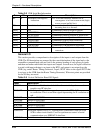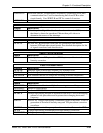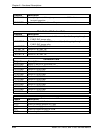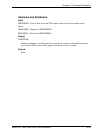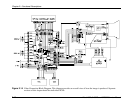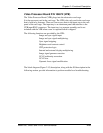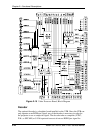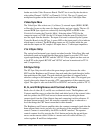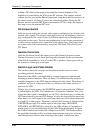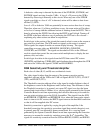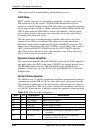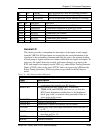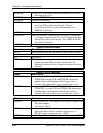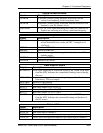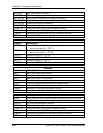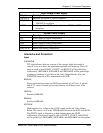
Chapter 2—Functional Descriptions
2-46 Model 330. 340SC, and 370SC Service Manual
Adding a DC offset to the output of the amplifier controls brightness. The
brightness is controlled by the SCB via the IIC interface. The operator controls
contrast level by pressing the B
RIGHT
button and using the up and down arrows on
the remote control. All three (3) colors are controlled together. During the DC
Restore interval when the BPCP pulse (measured at TP 10) is high, the output of
this amp is set to the nominal DC level.
On-Screen Switch
In the on-screen switch, the external video signal is multiplexed, in real time, with
internal video signals. The internal video signals used are full brightness, black, or
gray-scale/pyramid for a total of four (4) different signals that are multiplexed at
each point on the screen. The real-time multiplexing is used for the generation of
overlays and test patterns and is controlled by the switch logic. The output of the
on-screen switch can be monitored by test points TP5 (Red), TP6 (Green), and
TP7 (Blue).
Gamma Correction
After the On-Screen Switch the signal goes to the Gamma Correction section.
Gamma Correction is a non-linear gain stage that accounts for the non-linearities
of the ILA® Assemblies as well as for the CRT to produce a linear gray-scale on
the screen for a linear gray-scale input.
Switch Logic and Video Enable
This section controls the overlays and test patterns on the screen as well as
providing protective functions.
Protection of the CRTs is accomplished by sensing dangerous conditions and
initiating protective functions. There are three (3) conditions that the projector
considers dangerous to the CRTs that are addressed in this circuit. Those three (3)
conditions are loss of sweep (any of the six), defective video amp, and loss of
power to the VPB.
When a loss of sweep occurs, the /SWEEPOK signal is released by the VDB and
is pulled high by the VPB. This initiates two (2) protective functions. First (1st)
is that the video signal is immediately cut off. This is the fastest way to reduce the
CRT beam current to prevent CRT damage. It is also the least effective since even
when there is no video signal to the video amp, there can still be beam current due
to a high G2 or other causes. Therefore, a second (2nd) function is initiated when
/SWEEPOK goes high. The enable signal to the video amps, /RENABLE,
/GENABLE, and /BENABLE is released by the VPB (all three [3] regardless of
which sweep is lost) and pulled high by the VAB. When this happens, it signals
the VAB to remove some of the bias voltage from its CRT. This further reduces
the possibility that there will be any beam current present during loss of sweep
and although more effective than removing video signal, it takes more time.



